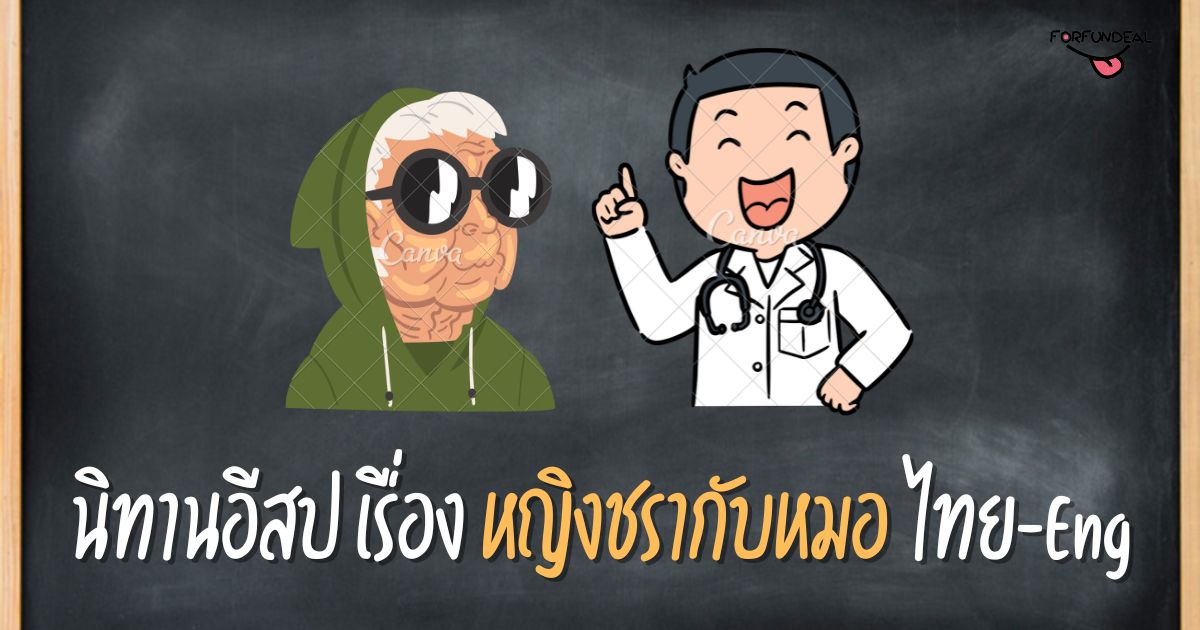“หญิงชรากับหมอ” เป็นนิทานอีสปที่บอกถึงเรื่องราวของการหลอกลวง มันแสดงให้เห็นว่าการกระทำที่หลอกลวงสามารถนำไปสู่ผลลัพธ์ที่ไม่คาดคิดได้อย่างไร
นิทานอีสปเรื่องหญิงชรากับหมอ
ในหมู่บ้านแห่งหนึ่ง มีหญิงชราคนหนึ่งอาศัยอยู่ ซึ่งมีปัญหาเรื่องสายตาผิดปกติ ด้วยความกังวลว่าจะสูญเสียการมองเห็นโดยสิ้นเชิง เธอจึงตัดสินใจขอความช่วยเหลือจากหมอผู้ชำนาญการ เธอเข้าพบจักษุแพทย์ที่มีชื่อเสียงและอธิบายสถานการณ์ของเธอ หมอตกลงที่จะรักษาเธอภายใต้เงื่อนไขเดียว เธอจะจ่ายเงินให้เขาก็ต่อเมื่อสายตาของเธอหายดีแล้วเท่านั้น
In a village lived an old woman who was troubled by her failing eyesight. Worried about losing her vision completely, she decided to seek the help of a skilled doctor. She approached a well-known oculist and explained her predicament. The doctor agreed to treat her under one condition: she would only pay him once her sight was fully restored.
หมอไปเยี่ยมบ้านผู้หญิงชราเป็นประจำโดยนำยารักษาโรคและยาหลายชนิดมารักษาดวงตาของเธอ อย่างไรก็ตาม เขามีแผนอันชาญฉลาด ในระหว่างการเยี่ยมแต่ละครั้ง เขาเก็บสิ่งของเล็กๆ น้อยๆ ในครัวเรือนอย่างระมัดระวัง โดยใช้ประโยชน์จากการที่ผู้หญิงไม่สามารถมองเห็นได้ชัดเจน ขณะที่เขาทำการรักษาต่อไป สมบัติของหญิงสาวก็ค่อยๆ หายไป
The doctor visited the old woman’s house regularly, bringing various salves and medicines to treat her eyes. However, he had a cunning plan. During each visit, he discreetly pocketed small household items, taking advantage of the woman’s inability to see clearly. As he continued his treatments, the woman’s possessions slowly vanished.
ในที่สุด หลังจากรักษามาหลายสัปดาห์ หมอก็ประกาศว่าสายตาของผู้หญิงคนนั้นดีขึ้น หญิงชราดีใจที่การมองเห็นของเธอดีขึ้น แต่ไม่นานเธอก็ตระหนักว่าข้าวของของเธอหายไปหลายชิ้น เธอเผชิญหน้ากับหมอและกล่าวหาว่าเขาขโมยของ
Finally, after several weeks of treatment, the doctor declared that the woman’s eyesight had improved. The old woman was pleased that her vision was better, but she soon realized that many of her belongings were missing. She confronted the doctor and accused him of theft.
เมื่อเผชิญหน้ากับหมอ เธอคร่ำครวญว่า “คุณรักษาดวงตาของฉันได้จริง ๆ แต่คุณกลับปล้นสมบัติของฉันไป ตอนนี้โลกของฉันมืดลงกว่าเดิม”
Facing the doctor, she lamented, “You have indeed cured my eyes, yet you have robbed me of my treasures. Now, my world is darker than before.”
หมอไม่ทันตั้งตัว พยายามปกป้องตัวเองโดยอ้างว่าเขาได้รักษาสายตาของเธอแล้วจริงๆ ซึ่งเป็นข้อตกลงที่พวกเขาทำไว้ แต่หญิงสาวกลับไม่มั่นใจ เธอแย้งว่าการมองเห็นของเธออาจจะดีขึ้น แต่ตอนนี้เธอไม่สามารถมองเห็นข้าวของของตัวเองได้ ทำให้สถานการณ์ของเธอแย่ลงกว่าเดิม
The doctor, caught off guard, tried to defend himself by claiming that he had indeed cured her eyesight, which was the agreement they had made. The woman, however, was not convinced. She argued that her vision might have improved, but now she couldn’t see her own belongings, making her situation worse than before.
หมอเรียกร้องเงินของเขา แต่ผู้หญิงคนนั้นยืนหยัดมั่นคง “ฉันจะจ่ายค่ารักษาที่ทำให้จิตใจฉันแย่ลงได้อย่างไร สิ่งที่คุณเอาไปคือแสงสว่างในบ้านของฉัน และการหายไปของสิ่งเหล่านั้นทำให้ฉันเข้าสู่ความมืดมิดมากขึ้น”
The doctor demanded his payment, but the woman stood firm. “How can I pay you for a cure that has left me poorer in heart? The things you took were the light of my home, and their absence has cast me into greater darkness.”
ด้วยความรู้สึกหงุดหงิดและรู้สึกถูกหลอก หญิงชราจึงปฏิเสธที่จะจ่ายค่าบริการให้กับแพทย์ เธอบอกเขาว่าการกระทำของเขาทำให้เธออยู่ในสภาพที่เลวร้ายยิ่งกว่าตอนที่เธอเข้าหาเขาเพื่อขอความช่วยเหลือ
Frustrated and feeling deceived, the woman refused to pay the doctor for his services. She told him that his actions had left her in a worse condition than when she had approached him for help.

นิทานเรื่องนี้สอนให้รู้ว่า
“ความซื่อสัตย์และพฤติกรรมที่มีจริยธรรมในความสัมพันธ์ทางวิชาชีพย่อมเป็นสิ่งที่พึงมีเสมอ”
- ความซื่อสัตย์และความไว้วางใจ: เรื่องราวเน้นย้ำถึงความสำคัญของความซื่อสัตย์และความไว้วางใจในความสัมพันธ์ทางวิชาชีพ การหลอกลวงและการใช้ประโยชน์จากจุดอ่อนของใครบางคนจะกัดกร่อนความไว้วางใจและทำลายความน่าเชื่อถือของมืออาชีพ
- ผลที่ตามมาของการหลอกลวง: การกระทำที่หลอกลวง แม้ว่าในตอนแรกจะประสบความสำเร็จ แต่ก็สามารถนำไปสู่ผลเสียในระยะยาวได้ ในเรื่องนี้ การกระทำของแพทย์ไม่เพียงแต่ทำลายชื่อเสียงของเขาเท่านั้น แต่ยังทำให้หญิงชราตกอยู่ในสถานการณ์ที่เลวร้ายอีกด้วย
- ความรับผิดชอบด้านจริยธรรม: ผู้ประกอบอาชีพ โดยเฉพาะผู้ที่อยู่ในสาขาเช่นการแพทย์ มีความรับผิดชอบด้านจริยธรรมในการให้ความช่วยเหลือและการดูแลอย่างแท้จริงแก่ผู้ที่แสวงหาความเชี่ยวชาญของตน การแสวงหาประโยชน์จากบุคคลที่อ่อนแอเพื่อผลประโยชน์ส่วนตัวขัดต่อความรับผิดชอบนี้
- ความเห็นอกเห็นใจและการพิจารณา: เรื่องราวเตือนใจให้เราเห็นอกเห็นใจและมีน้ำใจต่อผู้ที่ขอความช่วยเหลือจากเรา แทนที่จะใช้ประโยชน์จากความอ่อนแอของพวกเขา เราควรจัดลำดับความสำคัญความเป็นอยู่ที่ดีของพวกเขาและปฏิบัติต่อพวกเขาด้วยความเมตตา
- คุณค่าของความซื่อสัตย์: เรื่องราวเน้นย้ำคุณค่าของความซื่อสัตย์และความโปร่งใสในทุกปฏิสัมพันธ์ การแสดงเจตนาและการกระทำอย่างตรงไปตรงมาไม่เพียงแต่รักษาความไว้วางใจเท่านั้น แต่ยังป้องกันความเข้าใจผิดและอันตรายที่อาจเกิดขึ้นอีกด้วย
“Honesty and ethical behavior in professional relationships. should be something to have”
- Integrity and Trust: The story underscores the significance of integrity and trust in professional relationships. Deceiving and taking advantage of someone’s vulnerability erodes trust and damages the credibility of the professional.
- Consequences of Deception: Deceptive actions, even if initially successful, can lead to negative consequences in the long run. In the story, the doctor’s actions not only damaged his reputation but also left the old woman in a worse situation.
- Ethical Responsibility: Professionals, especially those in fields like medicine, have an ethical responsibility to provide genuine help and care to those seeking their expertise. Exploiting vulnerable individuals for personal gain goes against this responsibility.
- Empathy and Consideration: The story reminds us to be empathetic and considerate toward those who seek our help. Instead of taking advantage of their vulnerability, we should prioritize their well-being and treat them with kindness.
- Value of Honesty: The tale underscores the value of honesty and transparency in all interactions. Being forthright about intentions and actions not only maintains trust but also prevents misunderstandings and potential harm.
โดยสรุปแล้วนิทานเรื่องนี้เป็นเรื่องราวทำหน้าที่เป็นเรื่องราวเตือนใจเกี่ยวกับผลที่ตามมาจากการหลอกลวงและความสำคัญของการรักษามาตรฐานทางจริยธรรม ความเห็นอกเห็นใจ และความซื่อสัตย์ในการติดต่อทางวิชาชีพ

